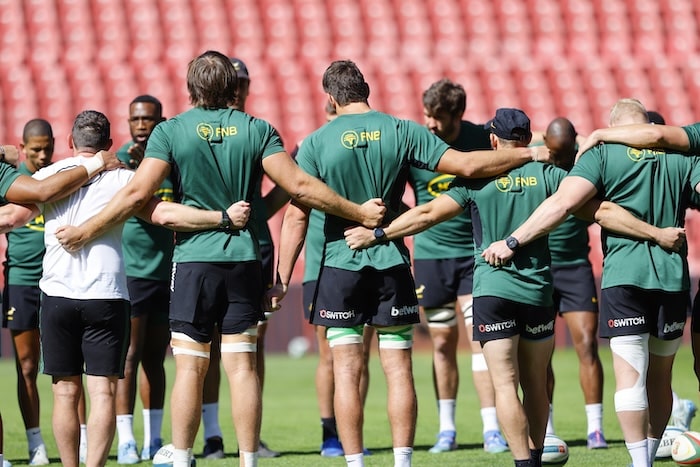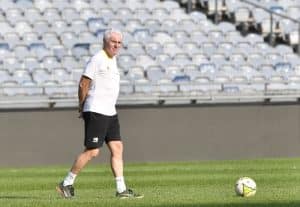One of the biggest weapons in the Springboks’ arsenal is their scrum, but what makes it so powerful? Ask Jon Cardinelli.
The 2023 World Cup quarter-final between France and the Springboks will be remembered for Cheslin Kolbe’s charge down of Thomas Ramos’ attempted conversion as well as Handré Pollard’s game – winning penalty in the latter stages.
A third play by Damian Willemse highlighted the audacity of the eventual World Cup-winners, and altered the course of rugby history.
Towards the end of the first half, Willemse fielded a high ball deep inside his own 22 metre area and called a mark.
Instead of taking the free-kick quickly or unleashing a booming kick, the fullback pushed his fists together to signal a scrum.
The Bok forwards proceeded to overpower their French counterparts and win a penalty at the ensuing set piece.
In the aftermath of the game, the rugby world marvelled at Willemse’s faith in the Bok pack, with The Telegraph describing the decision to scrum so close to their own tryline as “the ultimate flex”.
“That was a strategic plan by the coaching staff,” Willemse explained in a subsequent interview. “We said that we were going to have a time where our forwards were still fresh, when we had the upper hand or when we needed a big play.
“When I caught the ball and I put it down, I saw [tighthead prop] Frans Malherbe and everyone jogging back. Then I called the scrum and then the ref was like, ‘Are you sure?’ I said ‘Yeah’.”
The Boks were on the brink of defeat in the subsequent match against England, before a superior scrummaging performance in the second stanza brought them back into the contest.
Replacement loosehead prop Ox Nché – a self-professed cake aficionado as well as the author of the popular phrase “Salads don’t win scrums” won a penalty at the death to provide Pollard with the chance to win the game.
After the Boks defeated the All Blacks in the final to secure their fourth World Cup title – and their second in succession – World Rugby changed the laws.
Teams no longer had the option of a scrum from a free-kick, and those in the know described it as a subtle move to nullify one of South Africa’s greatest strengths.
Nevertheless, the Boks continued to adapt over the course of the subsequent season, winning 11 of their 13 matches – a run that included the 2024 Rugby Championship title – via a more expansive approach.
Their scrum also continued to evolve, and continued to force the opposition to concede penalties. By the end of 2024, many felt that Nché – essentially the talisman of a dominant Bok pack – deserved the World Rugby Player of the Year award, even after teammate Pieter-Steph du Toit walked away with the official prize.
While scrummaging is in South African rugby’s DNA, it’s only in the past seven years where the Boks have truly harnessed and maximised this strength.
When Rassie Erasmus returned to the country in 2018, he told anyone who would listen that South Africa had the players to win the World Cup and hold the No.1 ranking, and that scrummaging – and more specifically, scrum conditioning – would be the key to future success.
“Rassie challenged us to change our mindset regarding a number of things,” remembers former loosehead prop Beast Mtawarira, who was part of the Bok scrum that destroyed England and laid the platform for a famous victory in the 2019 World Cup final in Yokohama.
“In terms of the scrum, he put [assistant coach] Matt Proudfoot at the centre of the new project. South Africa is blessed with big athletes who love the scrum battle.
He empowered Matt to transform our players into a unit, and that unit into a weapon that could earn us penalties – and ultimately territory and points on matchday.
“Every live session was like a Test match,” Mtawarira continued.
“When we faced off against one another, it was war. You’re going hard at guys like Frans Malherbe and Vincent Koch, who are usually scrumming alongside you. The pressure was incredible, but if you came through that, you had reason to believe you were the best. As a collective, we started to believe that no other pack could live with us.”
The live scrummaging sessions encouraged players to fight for starting places ahead of big matches.
Over time, Erasmus developed two or three outstanding options across the respective positions, and ultimately two or three different forward combinations of similar quality.
Ahead of the 2019 World Cup final, England coach Eddie Jones observed that the Boks’ forward combination on the bench – dubbed the Bomb Squad – was better than the starting pack.
This proved to be prophetic, as South Africa took their scrum dominance to the next level in the second stanza of the decider, and the team proceeded to win by an emphatic 20-point margin.
Two years later, the Bok scrum f ired to set up a monumental 2–1 series victory against the British & Irish Lions.
The team continued to grow in the lead-up to the 2023 World Cup, and reached a new level over the course of a landmark 2024 season. Credit has been given to Erasmus, but scrum coach Daan Human, the former Bok, Free State and Toulouse prop, also deserves his fair share of the plaudits.
“They’re certainly the most dominant scrum I’ve seen in world rugby,” observed former Bok hooker Hanyani Shimange, who now serves as the Stormers scrum coach as well as one of SuperSport’s more erudite commentators.
“If you think about the 2019 World Cup final, the 2021 series against the Lions, and the playoffs at the 2023 World Cup, it’s hard to think of any other combination that comes close. Argentina were renowned for their scrum back in the day, and so were Italy when tighthead Martín Castrogiovanni was in his prime. But they weren’t as dominant as what we’ve seen from the Boks over the past few years.”
“There have been times when they’ve been challenged. Ireland were tactically good in the 2023 World Cup pool game, ensuring that they were quick on the hit, but towards the end the Boks took charge. That’s been the pattern, a team might survive the first half against the Boks, but then they succumb to the attack that comes later, often via the Bomb Squad, in the second stanza. Once the Boks have got a team on the ropes, they tend to dominate.”
While some of the current players are nearing the end of their careers, a number of established veterans such as Nché, Thomas du Toit and Malcolm Marx will be in their prime by the time the team departs for the 2027 World Cup.
Erasmus has also started to bring a new set of front-row players through, with Gerhard Steenekamp, Jan-Hendrik Wessels, Ntuthuko Mchunu, Johan Grobbelaar and Andre-Hugo Venter receiving opportunities in the green and gold across the 2024 season.
“It’s a golden generation of frontrankers, and you also need to acknowledge how much quality we have across the second and back rows,” noted Shimange.
“You take all of that, as well as the mindset of a coaching set-up that wants to dominate, and it’s a potent combination. The Boks and South African rugby are in a very strong space.”





